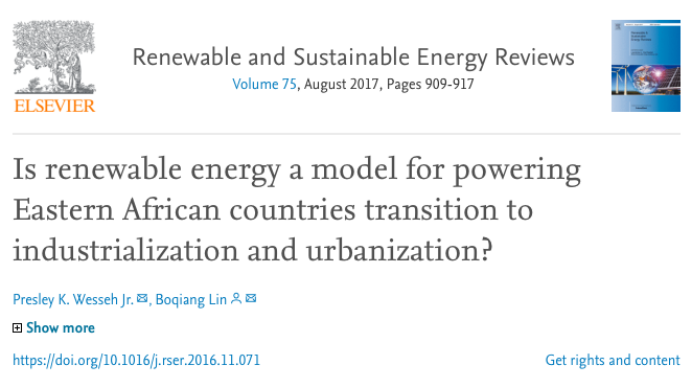
题目:可再生能源适合东非国家工业化和城市化进程吗?(Is renewable energy a model for powering Eastern African countries transition to industrialization and urbanization?)
作者:Presley K. Wesseh, Jr.,林伯强*
期刊:可再生和可持续能源评论(Renewable and Sustainable Energy Reviews)
详细:第75卷,2017年8月,第909-917页
DOI:https://doi.org/10.1016/j.rser.2016.11.071
文献导读:
东非是世界上电力供应缺口最严重的地区之一。电力供应缺乏严重威胁到该区域的工业化和城市化进程。近年来,联合国对减少温室气体排放的呼吁愈加强烈,限制使用化石燃料的政策在非洲国家也获得更加广泛的支持与认可。然而,需要认清的一个事实是,非洲国家和发展中经济体的资本和适应能力都普遍较低,更容易受到极端天气的影响。而气候变化因素将会对这些国家的能源系统产生一定的负面影响。风能和太阳能是目前国际上认为的增长最快的可再生能源。如果发展可再生能源能够缓解东非国家在能源匮乏和环境污染的双重压力,同时刺激当地经济增长的话,那么发展可再生能源将是一个合理的策略。近年来,可再生能源的技术进步和成本降低,为东非国家部署这一策略提供了可能。
基于12个东非国家1980-2011年的面板数据,采用对数线性超越生产函数,本文研究了可再生能源能否有效推动东非地区发展模式转变。文章的主要工作是估算了东非国家可再生能源和不可再生能源之间的替代弹性,以及分析两种能源对推动当地经济发展的潜在影响。
研究结果表明,不可再生能源对东非地区经济增长的推动作用超过可再生能源,增加对不可再生能源的投资将为东非经济转型带来更大的机遇。第二,技术创新在东非国家存在规模异质性。第三,东非国家存在可再生能源和不可再生能源之间双向替代的潜力。考虑到东非地区能源匮乏依然严峻,本研究对可再生能源支撑东非国家工业化和城市化的有效性提出了挑战。
Abstract:
This study profiles a conversation on the appropriateness of renewable energy as a model for powering development in East African countries. Estimated output elasticities of nonrenewable energy (0.29 – 0.48) are by far larger than those of renewable energy (−0.12 – 0.08); and as such, highlights the relative importance of the former. Also, the biased component of technical change shows higher technological progress for nonrenewable energy. Furthermore, substitution elasticities are positive (0.77 – 0.92); suggesting huge potential for a transition towards renewable energy. However, inherent limitations in renewables, documented in Wesseh and Lin, undermine the usefulness of East African countries reliance on renewable energy.
Keywords: Renewable energy; Nonrenewable energy; Energy poverty; Mitigation; Economic growth; Eastern Africa
 厦大总机:0592-2180000
|
地址:福建省厦门市思明区思明南路422号
|
邮政编码:361005
厦大总机:0592-2180000
|
地址:福建省厦门市思明区思明南路422号
|
邮政编码:361005